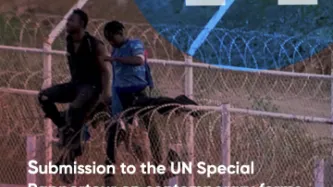Search
Content type: News & Analysis
As the New York Times reports the health programmes are being cut by USAID cuts, the US Government declares them as “inconsistent with the national interest or agency policy priorities.” Sadly at PI we know the kind of foreign aid that governments believe are in the national interest: surveillance funding.We’re alarmed by aid budgets being cut by governments world-wide. People will be hurt, and people will die.And while most of the news has been dominated by the US’s cuts, the UK and France…
Content type: Long Read
Over the last two decades we have seen an array of digital technologies being deployed in the context of border controls and immigration enforcement, with surveillance practices and data-driven immigration policies routinely leading to discriminatory treatment of people and undermining peoples’ dignity.And yet this is happening with little public scrutiny, often in a regulatory or legal void and without understanding and consideration to the impact on migrant communities at the border and…
Content type: Advocacy
Privacy International (PI), Fundaciòn Datos Protegidos, Red en Defensa de los Derechos Digitales (R3D) and Statewatch responded to the call for submission of the UN Special Rapporteur on contemporary forms of racism, xenophobia and related intolerance on how digital technologies deployed in the context of border enforcement and administration reproduce, reinforce, and compound racial discrimination.
This submission provides information on specific digital technologies in service of border…
Content type: Long Read
It was a quiet evening in Agadez, a bustling Saharan city in the centre of Niger. Thirty-five year old Agali Ahmed was sipping tea at a friend’s place, as he often did, when he received a message: police were at his uncle’s house. When he got there, Ahmed saw men in plainclothes, standing around the building’s gate. Inside, more men were searching the apartment. Three white men, who Ahmed guessed were Spanish, asked for his phone and started taking pictures of him. They told him to follow them…
Content type: Examples
In February 2019, the World Food Programme, a United Nations aid agency, announced a five-year, $45 million partnership with the data analytics company Palantir. WFP, the world's largest humanitarian organisation focusing on hunger and food security, hoped that Palantir, better known for partnering with police and surveillance agencies, could help analyse large amounts of data to create new insights from the data WFP collects from the 90 million people in 80 countries to whom it distributes 3…
Content type: Impact Case Study
What happenedSince the late 1980s governments across the world have been trying to build identity registries. By the early 1990s, there were similar policies being pursued by a number of governments across the Pacific region, with similar technologies from the same companies. In the mid-90s ID cards became a ‘modern’ policy, implementing smart cards. By 9/11 biometric IDs became the preferred solution to undefinable problems. Then came vast databases of biometrics to identify people — with…
Content type: News & Analysis
Big data consists mainly of data that is openly available, created and stored. It includes public sector data such as national health statistics, procurement and budgetary information, and transport and infrastructure data. While big data may carry benefits for development initiatives, it also carries serious risks, which are often ignored. In pursuit of the promised social benefits that big data may bring, it is critical that fundamental human rights and ethical values are not cast aside.…
Content type: News & Analysis
Humanitarian agencies are collecting personal information for Syrians caught in the crossfire of a drawn-out and bloody civil war. Indeed, refugees fleeing persecution and conflict, need to access services and protection offered by the world’s humanitarian community. But in the rush to provide necessary aid to those afflicted by the crisis in Syria, humanitarian organisations are overlooking a human right that also needs protecting: the right to privacy.
Humanitarian and aid agencies are…
Content type: News & Analysis
Privacy International today is proud to announce our new project, Aiding Privacy, which aims to promote the right to privacy and data protection in the development and humanitarian fields. Below is an outline of the issues addressed in our new report released today, Aiding Surveillance.
New technologies hold great potential for the developing world. The problem, however, is that there has been a systematic failure to critically contemplate the potential ill effects of deploying technologies in…
Content type: Report
Information technology transfer is increasingly a crucial element of development and humanitarian aid initiatives:
social protection programmes are incorporating digitised Management Information Systems and electronic transfers,
registration and electoral systems are deploying biometric technologies,
the proliferation of mobile phones is facilitating access to increased amounts of data, and
technologies are being transferred to support security and rule of law efforts.
Many of these…
Content type: News & Analysis
Below is an excerpt of an article that recently appeared on Slate, written by our partner Kevin Donovon, a researcher at the University of Cape Town, and Carly Nyst, Head of International Advocacy at Privacy International:
"Move over, mobile phones. There’s a new technological fix for poverty: biometric identification. Speaking at the World Bank on April 24, Nandan Nilekani, director of India’s universal identification scheme, promised that the project will be “transformational.” It “uses…
Content type: News & Analysis
Few understand why we focus on refugee privacy. Funders don’t understand it so don’t fund it; the public see the plight of refugees as seen on TV, not as a privacy issue; and often times the international community does everything it can to increase scrutiny of refugees. In this blog, I highlight the privacy issues facing refugees and how these issues can jeopardize refugees’ safety as much as any of the environmental, social, or political risks refugees encounter.
Refugees are amongst…










